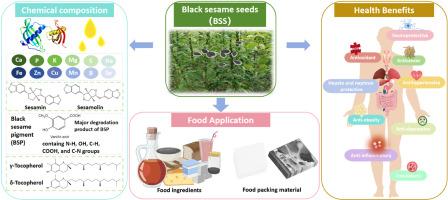黑芝麻:营养价值、健康益处和食品工业应用
IF 15.4
1区 农林科学
Q1 FOOD SCIENCE & TECHNOLOGY
引用次数: 0
摘要
背景黑芝麻(BSS)几个世纪以来一直被认为是一种传统的健康食品,具有显著的营养价值和药理特性,尤其是在中国等亚洲国家。人们对天然功能食品的需求不断增长,推动了黑芝麻产品的市场发展。充分了解 BSS 的植物化学成分和生物活性有助于提高其利用价值。此外,该综述还探讨了当前研究的局限性,并提出了优化 BSS 利用的策略。主要发现和结论BSS 的营养成分多种多样,包括蛋白质、脂类、木质素、矿物质、黑色素和维生素,其含量因栽培品种和加工条件而异。作为一种优质的营养食品资源,黑茶籽油具有显著的生物活性,动物和体外研究都证明了这一点,包括抗氧化、抗癌、抗炎、保护肝脏和肾脏、抗肥胖、保护神经、抗抑郁以及降血压和抗糖尿病作用。从营养补充剂到创新的食品包装解决方案,BSS 在食品工业的各种应用中也大有可为。它的感官特性和相关的健康益处广受赞誉,使其成为众多食品配方的重要成分,包括调味品、烘焙食品、乳制品和饮料。最后,综述指出,由于成分分析不足、健康益处研究有限、缺乏生物活性和毒性方面的临床研究,以及需要调查加工条件对健康促进特性的影响,因此无法更好地利用 BSS。本文章由计算机程序翻译,如有差异,请以英文原文为准。

Black sesame seeds: Nutritional value, health benefits, and food industrial applications
Background
Black sesame seeds (BSS) have been considered a traditional health food with notable nutritional value and pharmacological properties for centuries, particularly in Asian countries like China. The growing demand for natural and functional foods has driven the market development of BSS products. Fully understanding the phytochemical constituents and biological activities of BSS advances its high-value utilization.
Scope and approach
This review provides a systematic overview of BSS, highlighting the nutritional ingredients, health effects, and prospective food applications. Additionally, the review addresses current research limitations and proposes strategies for optimizing BSS utilization.
Key findings and conclusions
BSS has a diverse nutritional profile, encompassing proteins, lipids, lignans, minerals, black pigments, and vitamins, with their content varying by cultivar and processing conditions. As an excellent nutritional resource of food, BSS exhibits prominent bioactivities demonstrated in animal and in vitro studies, including antioxidant, anti-cancer, anti-inflammatory, hepato and nephro protective and anti-obesity, neuroprotective, antidepressant, as well as lowering blood pressure and anti-diabetic effects. BSS also holds promise for various applications in the food industry, from nutritional supplements to innovative food packaging solutions. It is widely appreciated for its organoleptic properties and associated health benefits, making it an important ingredient in numerous food formulations, including sauces, bakery and dairy products, and beverages. Finally, the review indicates that better utilization of BSS is hindered by inadequate component analysis, limited health benefits research, lack of clinical studies on biological activities and toxicity, and the need for investigation into the effects of processing conditions on health-promoting properties.
求助全文
通过发布文献求助,成功后即可免费获取论文全文。
去求助
来源期刊

Trends in Food Science & Technology
工程技术-食品科技
CiteScore
32.50
自引率
2.60%
发文量
322
审稿时长
37 days
期刊介绍:
Trends in Food Science & Technology is a prestigious international journal that specializes in peer-reviewed articles covering the latest advancements in technology, food science, and human nutrition. It serves as a bridge between specialized primary journals and general trade magazines, providing readable and scientifically rigorous reviews and commentaries on current research developments and their potential applications in the food industry.
Unlike traditional journals, Trends in Food Science & Technology does not publish original research papers. Instead, it focuses on critical and comprehensive reviews to offer valuable insights for professionals in the field. By bringing together cutting-edge research and industry applications, this journal plays a vital role in disseminating knowledge and facilitating advancements in the food science and technology sector.
 求助内容:
求助内容: 应助结果提醒方式:
应助结果提醒方式:


